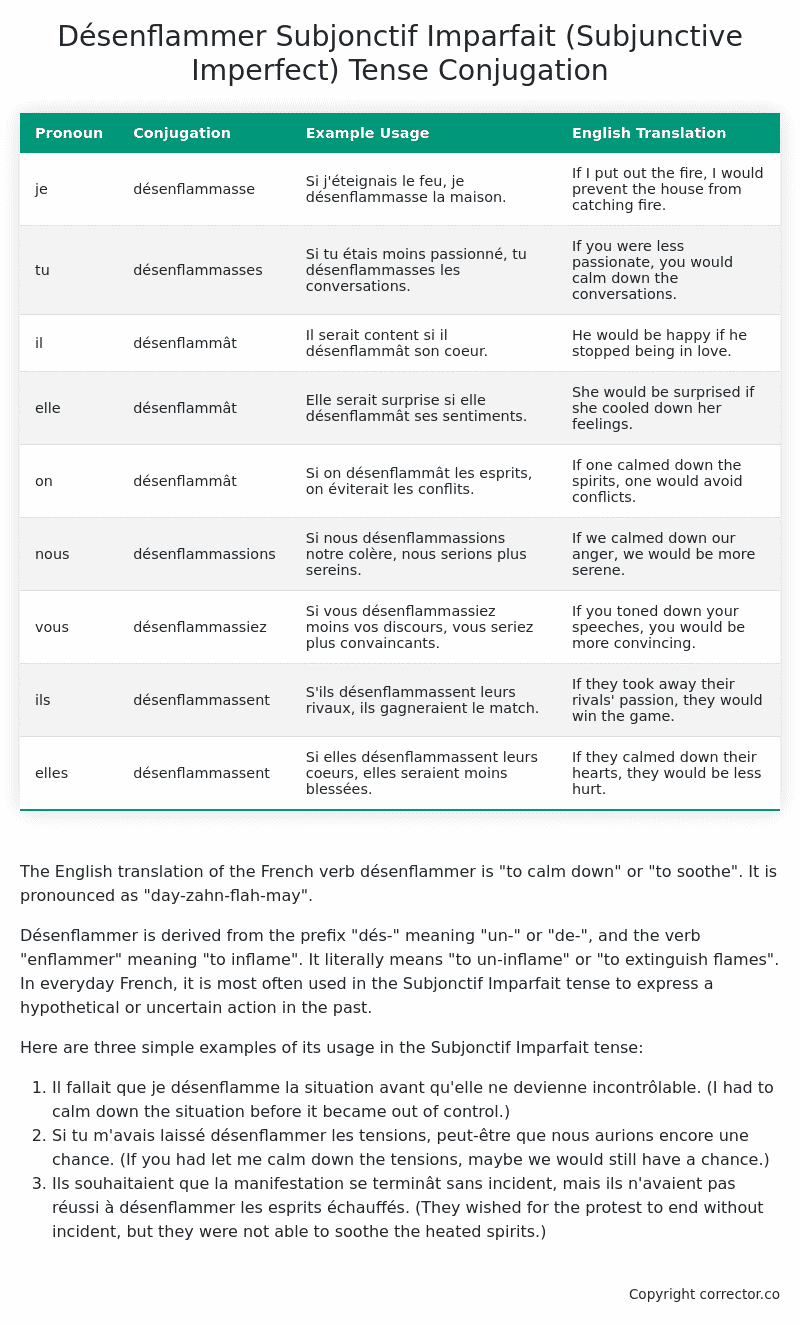Subjonctif Imparfait (Subjunctive Imperfect) Tense Conjugation of the French Verb désenflammer
Introduction to the verb désenflammer
The English translation of the French verb désenflammer is “to calm down” or “to soothe”. It is pronounced as “day-zahn-flah-may”.
Désenflammer is derived from the prefix “dés-” meaning “un-” or “de-“, and the verb “enflammer” meaning “to inflame”. It literally means “to un-inflame” or “to extinguish flames”. In everyday French, it is most often used in the Subjonctif Imparfait tense to express a hypothetical or uncertain action in the past.
Here are three simple examples of its usage in the Subjonctif Imparfait tense:
- Il fallait que je désenflamme la situation avant qu’elle ne devienne incontrôlable. (I had to calm down the situation before it became out of control.)
- Si tu m’avais laissé désenflammer les tensions, peut-être que nous aurions encore une chance. (If you had let me calm down the tensions, maybe we would still have a chance.)
- Ils souhaitaient que la manifestation se terminât sans incident, mais ils n’avaient pas réussi à désenflammer les esprits échauffés. (They wished for the protest to end without incident, but they were not able to soothe the heated spirits.)
Table of the Subjonctif Imparfait (Subjunctive Imperfect) Tense Conjugation of désenflammer
| Pronoun | Conjugation | Example Usage | English Translation |
|---|---|---|---|
| je | désenflammasse | Si j’éteignais le feu, je désenflammasse la maison. | If I put out the fire, I would prevent the house from catching fire. |
| tu | désenflammasses | Si tu étais moins passionné, tu désenflammasses les conversations. | If you were less passionate, you would calm down the conversations. |
| il | désenflammât | Il serait content si il désenflammât son coeur. | He would be happy if he stopped being in love. |
| elle | désenflammât | Elle serait surprise si elle désenflammât ses sentiments. | She would be surprised if she cooled down her feelings. |
| on | désenflammât | Si on désenflammât les esprits, on éviterait les conflits. | If one calmed down the spirits, one would avoid conflicts. |
| nous | désenflammassions | Si nous désenflammassions notre colère, nous serions plus sereins. | If we calmed down our anger, we would be more serene. |
| vous | désenflammassiez | Si vous désenflammassiez moins vos discours, vous seriez plus convaincants. | If you toned down your speeches, you would be more convincing. |
| ils | désenflammassent | S’ils désenflammassent leurs rivaux, ils gagneraient le match. | If they took away their rivals’ passion, they would win the game. |
| elles | désenflammassent | Si elles désenflammassent leurs coeurs, elles seraient moins blessées. | If they calmed down their hearts, they would be less hurt. |
Other Conjugations for Désenflammer.
Le Present (Present Tense) Conjugation of the French Verb désenflammer
Imparfait (Imperfect) Tense Conjugation of the French Verb désenflammer
Passé Simple (Simple Past) Tense Conjugation of the French Verb désenflammer
Passé Composé (Present Perfect) Tense Conjugation of the French Verb désenflammer
Futur Simple (Simple Future) Tense Conjugation of the French Verb désenflammer
Futur Proche (Near Future) Tense Conjugation of the French Verb désenflammer
Plus-que-parfait (Pluperfect) Tense Conjugation of the French Verb désenflammer
Passé Antérieur (Past Anterior) Tense Conjugation of the French Verb désenflammer
Futur Antérieur (Future Anterior) Tense Conjugation of the French Verb désenflammer
Subjonctif Présent (Subjunctive Present) Tense Conjugation of the French Verb désenflammer
Subjonctif Passé (Subjunctive Past) Tense Conjugation of the French Verb désenflammer
Subjonctif Imparfait (Subjunctive Imperfect) Tense Conjugation of the French Verb désenflammer (this article)
Conditionnel Présent (Conditional Present) Tense Conjugation of the French Verb désenflammer
Conditionnel Passé (Conditional Past) Tense Conjugation of the French Verb désenflammer
L’impératif Présent (Imperative Present) Tense Conjugation of the French Verb désenflammer
L’infinitif Présent (Infinitive Present) Tense Conjugation of the French Verb désenflammer
Struggling with French verbs or the language in general? Why not use our free French Grammar Checker – no registration required!
Get a FREE Download Study Sheet of this Conjugation 🔥
Simply right click the image below, click “save image” and get your free reference for the désenflammer Subjonctif Imparfait tense conjugation!

Désenflammer – About the French Subjonctif Imparfait (Subjunctive Imperfect) Tense
Formation
Common Everyday Usage Patterns
Interactions with Other Tenses
Subjonctif Présent
Indicatif Passé Composé
Conditional
Conditional Perfect
Summary
I hope you enjoyed this article on the verb désenflammer. Still in a learning mood? Check out another TOTALLY random French verb conjugation!


